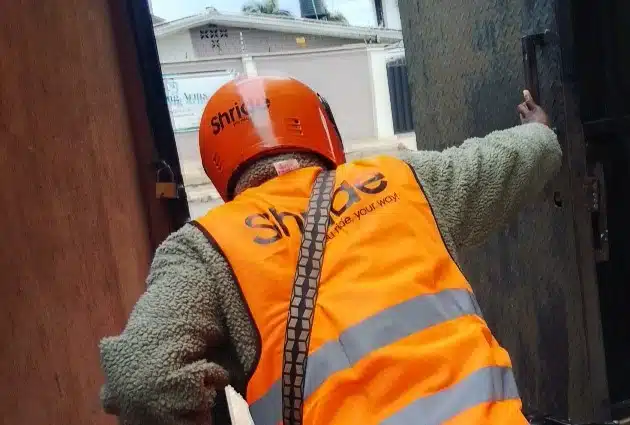In Nigeria’s congested cities and underserved towns, the simple act of moving goods or people can often feel like a battle.
From inconsistent pricing and long wait times to a general lack of trust in informal transport, the average Nigerian is forced to navigate a chaotic web of transport options daily. Even a short trip can sometimes turn into a stressful negotiation.
In places like Ibadan, where motorbikes and tricycles are a major form of transport, these problems are all too familiar.
For PeaceMark Hammed, Founder and CEO of Shride, one such incident in 2024 sparked a major pivot in his business. What should have been a brief trip for one of the team members turned into an hour of haggling, waiting, and chasing after available rides.
“The time wasn’t spent on the road; it was spent finding a driver, negotiating, and hoping they would agree to the price,” Hammed explains.
This frustration brought an old but persistent problem into focus. Hence, Shride, a mobility and logistics platform based in Ibadan, Oyo State, was born.
“Shride is revamping the old-fashioned transportation system. Moving from one point to another should not be so difficult,” Hammed tells Techpoint Africa.
Rethinking how everyday people move
Founded in 2016, Shride initially operated as a delivery partner for businesses, moving items for platforms like Jumia, Konga, and FairMoney, and even handling logistics for government bodies like JAMB and WAEC, mostly dispatching via WhatsApp and a basic website.
However, following the incident in 2024, Hammed and his team decided it was time to pivot into consumer mobility. With a full relaunch on August 1, 2024, Shride has now pivoted into a consumer-facing platform that blends logistics, ride-hailing, and food delivery, all in one app.

Victoria Fakiya – Senior Writer
Techpoint Digest
Stop struggling to find your tech career path
Discover in-demand tech skills and build a standout portfolio in this FREE 5-day email course
As of June 2025, Hammed says the company has generated over ₦15 million in gross revenue, from which it has paid more than ₦10 million to riders. In the past ten months, Shride has processed over 5,000 trips.
A mobility ecosystem for Nigerian realities
At its core, Shride is focused on hyper-local rides. On its platform, users can hail motorcycles and tricycles to pick them up directly from their homes, with fares starting as low as ₦500, and rarely exceeding ₦5,000.
Beyond passenger rides, Shride wants to move packages and food in the same manner. On its app, users can place food orders from local restaurants or book delivery services without having to juggle between platforms.
“Think of it like Bolt and Chowdeck, but tailored to Nigeria’s infrastructure. Our model is built for Nigerians in Nigeria.” Hammed says.
All trips are chartered, with no detours, no shared pickups or drop-offs en route. The fares are calculated based on distance, estimated time, and even weather.
The platform operates a pay-before-service model, which helps mitigate ride cancellations and cash-related friction, while ensuring revenue flow.
Like its more established competitors — Uber and Bolt — Shride runs a wallet-based system where users can credit their wallets and pay for rides. Once signed up, users can generate virtual accounts — integrated with Paystack — and fund them through their banks. Over 10,000 accounts have been created so far.
Inside Shride’s business model
Shride operates a multi-service platform that connects users to motorcycle and tricycle rides, package delivery, and food ordering from local restaurants. The platform consolidates these verticals into one app.
However, what sets it apart is how it tailors these services to underserved cities like Ibadan, where motorcycles and tricycles are the primary means of daily transportation.
“Our biggest advantage is our services. We are not even chasing vain metrics; we are solving everyday problems.” says Hammed.
The company targets users who primarily rely on these transport systems and residents frustrated by informal pricing, driver availability, and the stress of negotiation. This creates a niche by targeting areas that larger players don’t traditionally prioritise.
Riders keep 80% of each fare, while Shride takes a 20% commission, which is used to fund insurance (up to ₦1 million for work-related injuries), ride-onboarding kits, and training/vetting programmes.
Challenges along the way
Despite hitting good numbers and gaining traction around their target audience, Shride’s journey hasn’t been smooth sailing.
“Before our official launch, we had a series of challenges. Our developer got robbed of his laptop. Although there was a backup demo, it wasn’t the updated version, so we almost had to rebuild everything from scratch,” Hammed says.
On the launch day , there were Endbadgovernance protests across several cities, which forced the company to cancel the event, as it was a physical launch.
Pre-launch, the platform attracted a waitlist of 600 people, a figure that surged quickly after going live. But with this growth came an unexpected challenge.
“Before we knew it, Google flagged us as fraud on the Play Store, which took a while for us to settle with documents and all,” Hammed recalls.
This set them back, as many who had heard of the app could not download it directly from the Play Store. Consequently, the team had to share download details directly with people who wanted to download the app, while others could download it via the website.
Another issue the company battled with was rider behaviour at the beginning.
“At first riders were not really well trained. They dictated where to pick the users and had lousy behaviour, and so we had to ensure all riders went through extensive training before they were allowed to attend to customers,” Hammed shares.
While the startup is still in its early days, conflict with driver expectations is one that it is sure to encounter as drivers increasingly demand better pay. In Nigeria, Uber and Bolt riders went on strike in June 2023, demanding a 200% price increase following the fuel hike.
Hammed acknowledges that rising transportation costs could pose a future challenge, but says the company plans to address this through transparent pricing strategies and a gradual shift to electric vehicles.
“That’s why we want to go electric, but as of now, we use a dynamic pricing model for moments like that. We charge a little fee reflecting the increase in fuel price. If the price stabilises or comes back to normal, we turn off the dynamic price. We just make it make sense and communicate with both riders and customers.”
The startup says it is in talks with electric vehicle company, Spiro, to facilitate its move towards green mobility.
What’s more, and what’s next for Shride
To drive further adoption, Shride is rolling out several user-focused features. One of which is the trike/bike pooling, which allows two users going in the same direction to share a ride while reducing costs.
“If you’re going from point A to point B and there’s also somebody going in the same direction from your location, then we can plan your rides together. Two people can go in the same way at the same time on the same trip at the price of one,” Hammed explains.
These pooling requests come with a five-minute wait limit.
“After picking up the first user, the next would be notified of the arrival of the rider and the five-minute limit. The app will notify the user once three minutes is up, and then the rider calls after the five-minute mark. However, if there’s no response and the user doesn’t reach out or give an excuse, then the driver is obligated to leave without a refund to the user,” Hammed says.
Another user-friendly feature is Faaji Friday, a weekly promo that lets users take rides across the city for just ₦200.
Shride also runs a referral system where riders can earn bonuses for bringing new drivers onto the platform. This referral system has paid out over ₦3 million to riders.
The platform is also looking to reach students in higher institutions like Unilag, University of Ibadan and Obafemi Awolowo University, Ile-Ife, with electric bikes and scooters.
Currently based in Ibadan, the company plans to expand to other locations by January 2026.
“We’re looking to cover small cities before moving to bigger, more congested places like Lagos. However, that is already in the plan for us. We hope to expand to neighbouring states soon. “











